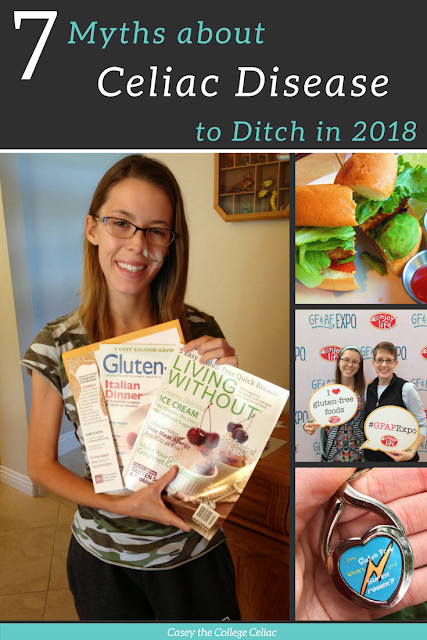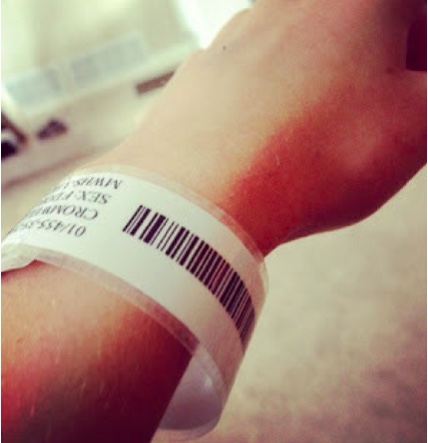New blog post!
How do I know if I have celiac disease? What celiac disease facts should people know? Is there a celiac disease pill that can allow celiacs to eat gluten again? Today, I’m answering questions like these while shattering seven common myths about celiac disease. After all, incorrect assumptions about celiac disease or the gluten free diet can actually be just as dangerous as not knowing anything about celiac disease at all, and some of these myths are so sneaky, you might not even realize that they’re not true.
Whether you have celiac disease, know someone who needs to eat gluten free or just want to understand this chronic illness a little better, this post is for you. Keep reading to discover seven common myths or misconceptions about celiac disease that everyone – from medical professionals to the general public – should be aware of!
1. Everyone with celiac is skinny.
I’ll be the first to admit that some people with celiac disease are “skinny.“ (
In fact, I’ve even had people say they wish they had celiac disease so "they could be skinny like me.”) It’s also impossible to deny that there are some biological reasons for the correlation between thinness and celiac disease. Before a celiac diagnosis, people can be skinny because their body
actually isn’t absorbing all of the nutrients they’re eating. After being diagnosed with celiac disease, people might also lose weight because they can’t eat their old favorite (gluten-filled) comfort foods.
However, skinniness is anything but an automatic requirement or side effect of celiac disease. In fact,
studies have found that 20-40 percent of people with celiac disease are overweight or obese at the time of their diagnosis. People can also gain weight on a gluten free diet (whether they’ve adopted it because of celiac disease or it’s “faddish” reputation) for several reasons. Once they go gluten free, diagnosed celiacs might actually absorb nutrients for the first time in years, resulting in weight gain. Thanks to the recent increase in gluten free processed foods available (more on that under number four), it’s also easy to replace gluten-filled comfort foods with gluten free versions…and
research also reports that gluten free processed foods often have more calories, sugar and fat than their wheaty companions.
So, sure, some celiacs might fit the gluten free stereotype of thinness, but that certainly isn’t universal. And if anyone ever says that you “can’t” have celiac disease because you’re not “thin enough” (unfortunately, I’ve even heard stories of doctors saying this!), know those kind of statements are 100% inaccurate!
2. If you think you have celiac disease, you should just go gluten free and not bother with asking your doctor for more information.
I get it. You’ve been feeling cruddy for months, hear about the possible benefits of a gluten free diet and immediately want to see if that’s your magic cure.
As Erica from Celiac and the Beast explains, though, receiving an official celiac diagnosis is important for a variety of reasons, and going gluten free before undergoing the proper tests for celiac disease can interfere with the results.
So if you do suspect that gluten doesn’t agree with you (see the next point for more info on how to know if you have celiac disease), I
highly recommend going to your doctor and getting tested for celiac disease before going gluten free on your own.
3. Celiac disease only involves digestive symptoms.
Since celiac disease primarily involves intestinal inflammation and damage, it makes sense that people might initially assume that symptoms of celiac disease only involve the digestive tract. However, celiac disease actually has over 200 symptoms, ranging from skin rashes to bone and joint pain to infertility and/or miscarriages.
This celiac disease myth is perhaps the most dangerous since assuming that celiac disease only exhibits signs in the digestive system can cause doctors to overlook patients with more “atypical” symptoms of celiac disease. In fact, a 2017 study found that it takes an average of 3.5 years for people with non-digestive symptoms of celiac disease to be properly diagnosed….which is over three years longer than it takes people who report gastrointestinal symptoms to hear, “You have celiac disease."
This is one of the reasons why you need to be your own health advocate when you’re trying to find a proper medical diagnosis. If there is a history of celiac disease in your family and you suspect you may have it, don’t let doctors dismiss non-digestive-related symptoms of celiac disease. I was lucky enough to have a very thorough doctor who ran several tests (including a blood test for celiac disease) when I first complained of fatigue, nausea and random weight loss. Unfortunately, not all doctors are as aware of celiac disease, so don’t be afraid to speak up if you need to.
4. Eating gluten free nowadays is easier than ever.
Considering that you can currently walk into nearly any grocery store and find some kind of gluten free food (even if it’s naturally gluten free food like filtered water labeled as so), it may seem like eating a celiac disease diet is easier today than ever. To some extent, this is true. There are hundreds of gluten free breads, snack bars, pastas, packaged goods, etc on the market – and
many of them actually taste pretty dang good!
However, it’s also true that the explosion in popularity of gluten free foods
also makes it more challenging to eat safely with celiac disease in several ways. Because a gluten free diet has been wrongly equates with weight loss, many restaurants now offer “gluten free” menus that are actually not celiac safe (hello, cross contamination). Problems can also arise when restaurant diners claim to need a gluten free diet but then “cheat” by nibbling on the bread basket, reducing how seriously restaurants take gluten free meal orders.
Don’t get me wrong – I’m extremely thankful for having more gluten free options. Heck, if I really needed to, I could choose from a variety of gluten free snacks at my local CVS! However, I also think it’s crucial for people to recognize the negative effects of the gluten free fad diet, and not wrongly equate “gluten free” with “celiac safe.”
5. You can be “cured” of celiac disease and eat gluten again.
Out of all the celiac disease myths I’m writing about today, this one probably bothers me the most. Last year, I read several Facebook posts, tweets and personal stories from people receiving official celiac diagnoses, going gluten free, being re-tested for intestinal damage, and, seeing no damage, assuming they could safely eat gluten again. I even read one story where the patient’s doctor actually said that her clean screening meant she was cured!
Having healthy intestines after going gluten free for celiac disease does not mean you are “cured” and can eat gluten from now on without any issues. It just means that you’ve properly removed gluten free your diet and, as a result, are not suffering from any gluten-related damage. As much as we might hope otherwise, celiac disease is a chronic illness. Unlike some food allergies, you cannot outgrow celiac disease and the only treatment is a strict gluten free diet.
In the future, maybe there will be a celiac disease pill or another answer to, “Can celiac disease be cured?” But for now, the only way to thrive with celiac disease is by eating gluten free.
6. Sourdough bread is “low” in gluten and can therefore be “safely” eaten by celiacs.
Another celiac disease myth that sounds too good to be true – and actually is? That “low gluten” breads like sourdough are safe for celiacs to eat. Some sourdough bakers claim that the fermentation process effectively “neutralizes” the gluten in their bread, making it safe for celiacs to eat. Their claims gained some steam from a 2011 study in Italy in which several celiacs were given specially-prepared sourdough bread and did not report any physical issues. However, that study used bread fermented through a very particular process (AKA, a process not available to the common baker) and intestinal damage was still found in the participating celiacs. It’s also important to note that the
Gluten Watchdog recently tested three different sourdough brands and found that sourdough bread still contains
a lot more gluten than the 20 ppm or below that is
considered “safe” for celiacs.
Similarly questionable options for celiacs include the “low gluten” treats you might see popping up in restaurants (hello again, gluten free fad diet) or gluten-removed beers like Omission. If someone has gluten intolerance or a sensitivity to fodmaps, they might be able to tolerate a little gluten here and there. The same cannot be said for celiacs, who actually experience intestinal atrophy from gluten.
(And, honestly, if you’re really craving a delicious and fluffy slice of bread, there are lots of
tasty gluten free options! So why even risk trying “low gluten” options – especially before more research is done to explore the long-term effects of sourdough or other “low gluten” foods in those with celiac disease – when
you can eat gluten free and deliciously?)
7. Being diagnosed with celiac disease and needing to eat gluten free is the end of the world.
One of the most common comments that I hear celiacs complaining about is, “I don’t know how you stay 100% gluten free. I could never do it!”
First of all, when you have celiac disease, eating a gluten free diet is not about willpower. Feeling cruddy and/or knowing that you’re doing major damage to your body (that could
result in major side effects like cancer, bone loss or mental health issues down the road) definitely helps make it a lot easier to turn down the pizza or cupcakes.
Secondly, though, these kind of comments reflect the assumption that giving up gluten would be one of the worst things someone could have to do. Sure, it can be extremely challenging, especially right after a celiac diagnosis. Eating gluten free can mean spending more time shopping for food (all that label reading!), spending money on food and spending some socials awkwardly drinking water while everyone else enjoys gluten-filled party treats.
Celiac disease is a challenging, complex and often misunderstood chronic illness. However, with the right information – and knowledge about which “common knowledge” is actually quite wrong – you can do more than thrive with celiac disease. You can even love living gluten free.
What’s one myth about celiac disease or the gluten free diet that you want broken? Tell me in the comments!
via Blogger http://ift.tt/2HMPBCO
from WordPress https://ift.tt/2GoHnA1
via
IFTTT








No comments:
Post a Comment